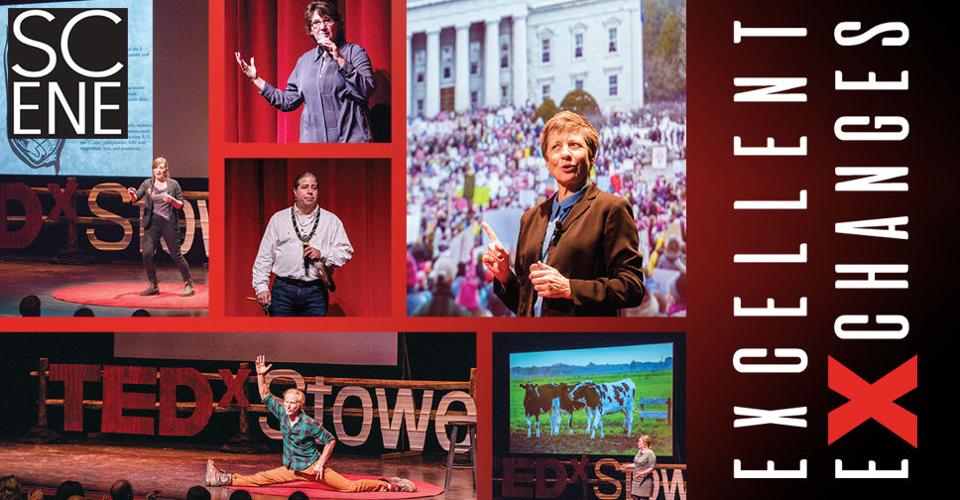The logo for last week’s TEDx event at Spruce Peak Performing Arts Center is a microphone set against a backdrop of black and red flannel, the kind you see plenty of Vermonters wearing every fall.
It was an appropriate image for an event in which a dozen speakers told stories about the Green Mountain State, stories that, taken individually, stood solid on their own merits, but when combined into an entire evening, became a sort of warm, fuzzy, flannelly fabric.
The evening’s host, Susanne Schmidt — a standup comedienne and producer for The Moth storytelling group — noted that organizer Tessa Rawson had an idea.
“And that innovative idea was that Vermonters might have something to say about community,” Schmidt said.
TED stands for Technology, Entertainment, Design, which tends to be more of a suggestion than a dictum, considering the breadth of topics being discussed in short — fewer than 18 minutes — TED talks. Since 1984, the organization has amassed more than 2,700 talks, available in 100 languages.
TEDx gives communities the avenue to host their own talks, which TED then cultivates and adds to its growing list. The Stowe event brought together people from the Northeast Kingdom, from right down in Stowe Hollow, from Burlington and elsewhere in the state, and topics ranged from agriculture and food systems to internet and 3D technology. In between was a thread, a vast and varied philosophizing on how to keep communities tight, accented with a smattering of brass and soul, rounded out by animation and videos.
Tiffany Bluemle, a former Mondale presidential campaign staffer who was executive director of Vermont Works for Women, started things off with a message: Society doesn’t always work for women.
Bluemle said when she was a kid, it seemed that, with, women like Sandra Day O’Connor, Sally Ride, Geraldine Ferraro and Shirley Chisolm, “a woman’s place at the table, at any time, was a given.”
“We have named a year ‘the year of the woman’ nine times since 1966, often in anticipation of change,” she said, yet bold proclamations like that inure people to fighting harder for it.
“We can do better,” she said.
There was no shortage of successful women onstage at TEDxStowe, including two changing Vermont’s food system.
Sarah Waring, CEO of the Center for an Agricultural Economy, told of how people stepped up after the barn at Pete’s Greens in Craftsbury burned down, and how the proprietor turned right around and helped start the Vermont Food Fund, of which Waring’s organization is the steward.
The fund gives no-hassle “friendly term” loans to farmers who need an infusion of capital to get their operations going. Since the fund was started, Waring said, it’s loaned $1 million to 67 recipients, none of whom defaulted on their loans.
“We don’t tend to treat the agents in our food system like agents in an economy,” Waring said. “We tend to treat them more like neighbors.”
Blair Marvin, co-owner of Elmore Mountain Bread, told of how a friend, a fellow miller and baker, sent her three different bags of flour that kind of blew her mind. It wasn’t the simple, white powdery stuff that she’d initially seen as more “a blank slate” and less a complex ingredient; this was earthy and fragrant.
“It smelled like peas,” she said of one bag, deserving a scent redolent of the field it grew in. “This was terroir.”
Marvin said throughout history, every community had a farmer, a miller and baker at the center of the local food system, and they allowed things to be eaten fresh. So, she and her husband changed their ideas about baking, built a mill, and found themselves as part of the farming process.
Other speakers gave advice on how to live in a community.
Trevor Crist, founder and CEO of Stowe tech company Inntopia, talked about gapers — “You may know them as Jerrys, Joeys, newbies, punters,” Crist explained — those oft-maligned skiers who try too hard to be cool, while the locals joke behind their backs.
Crist said the biggest increase in skier traffic is among those 50 years and older, not because more old people are taking up the sport, but just because they’re getting older.
They’re also the ones who come up from the city with their kids and buy lift tickets, rent equipment, stay in hotels and spend a lot of money in restaurants and bars.
Moral of the story, Crist said: “Be nice to a gaper.”
Sometimes, when people aren’t being nice to you, it’s best to find a like-minded community that is. That’s a lesson shared by Edward Habeck, a junior at Peoples Academy in Morrisville.
Habeck took the Spruce stage with a flugelhorn and, without a word, played a three-minute solo from Miles Davis’ “Adagio” on the “Sketches of Spain” album. He followed that up with a story of how his nervous tics and speech trip-ups, unnoticed when he was younger, brought him endless bullying when he got to high school.
So, he lost himself in his music, and surrounded himself with friends who were doing the same thing. And in creating music, he found happiness.
“The beautiful thing about band was that we were all seen as equal,” Habeck said. “We all had the same aspirations and goals in that environment and in that moment.”
Another high school junior, Ryer Leveille, took the stage sporting a pair of cow slippers and talked about the inherent uniformity of small communities. Small communities include workplaces, sports teams, clubs or classrooms, she said. “They’re anywhere, anyplace, where just about everybody knows everybody.”
Sometimes that uniformity lends itself to fear for being quirky or outside the box — cue the cow slippers — fear of being singled out and bullied.
“Remember, when in a small community, judgment can hit harder than intended,” she said. “There are less opinions to go around.”
From the other side of the school community, Harwood Union High School teacher Katherine Cadwell talked about how she’s changed her teaching tactics in the era of smartphones, where teens are constantly lured away by, well, just about everything other than classwork.
Her solution was to step aside and have the students run the table, literally. She groups their desks in a circle or has them all sit around a table and work out problems. It’s called the Harkness Method, and it isn’t any easier on the students than traditional raise-your-hand type classrooms, because everyone has to participate.
“None of us is as smart as all of us,” Cadwell said.
Speaking of the online world, there’s Front Porch Forum. Founder Michael Wood-Lewis talked about setting up the online forum in the early 2000s after wondering why he and his wife were having trouble meeting their Burlington neighbors. He cited a survey in which only one in four Americans know their closest neighbors.
One summer evening, he saw some people cleaning up after an annual block party, and wondered why they hadn’t heard of it.
“No one should have to live here for 10 years before they find out about their own annual block party,” he said.
It wouldn’t be a TED talk without technology.
Tyler McNaney supplied something tactile, and since we’re talking about threads ...
McNaney is the under-30 inventor of a bit of tech called the Filabot, a device that allows consumers with 3D printers a steady supply of materials by turning plastic waste into 3D printer filament.
While most of the other speakers talked about community as some sort of relationship, McNaney spoke about the human species’ relationship with plastic, one that put trash in a vastly superior position, at least as far as pure volume goes.
“Waste is only waste if the loop is not closed,” he said.
Stowe native Rusty DeWees has been floating in and out of Stowe’s social nooks and crannies as two different people, himself and his alter-ego, The Logger, who manages to mix comedy with true small-town insight.
Case in point was DeWees’ story about Plate, an upscale-cool restaurant on Main Street that used to be a funeral parlor. Next to the entryway used to be two large lanterns that Roger Stafford, the funeral director, would light when someone died.
“I always thought, as a kid, the lights were on because the lights went out,” he said. “I liked that tradition.”
Some traditions are older than those celebrated by white Vermonters, and a few of TEDxStowe’s speakers gave the event some old-world grounding and connectivity.
Jim Taylor, a councilman and elder with the Elnu Abenaki tribe and Turtle Clan, welcomed the audience and the speakers to Spruce Peak, and offered a traditional song and greeting in the native tongue to bless the proceedings: “Welcome to our homeland. Thank you for this day, Great Spirit. Thank you for this day.”
Ali Dieng brought his African traditions with him to Burlington, and then some. The Mauritania native moved to Vermont in 2005, and fell in love with the wilderness of the state. But he also realized that many New Americans living in Burlington were in their own wilderness.
He founded Parent University, which helped teach parents whose kids were going through the public-school systems, helped them navigate the often-strange languages and customs of American education.
He ended with an African proverb: “If you want to go fast, go alone. But if you want to go far, let’s all go together.”
Dieng now has an even larger platform, having been recently elected to the Burlington City Council, its first New American and the only person of color.
Another Abenaki speaker, Melody Walker Brook, whether by design or not, seemed to tie the whole night together. The event’s speakers, even as they spoke of the little corners of their communities, had a cumulative effect on the entire evening.
Brook talked about how, when the Abenaki talk about seven generations, they talk about how everyone ought to at one point remember their great-grandparents and meet their great-grandchildren. For those who can’t, people like Brook come in.
“I am a weaver,” she said.
She may serve as the chair of the Vermont Commission on Native American Affairs, but within her tradition, she sees herself and those like her as the ones keeping the tapestry going.
“Our future is found in our past,” she said. “Never forget the stories of all living things.”













































(0) comments
Welcome to the discussion.
Log In
Keep it clean. Please avoid obscene, vulgar, lewd, racist or sexual language.
PLEASE TURN OFF YOUR CAPS LOCK.
Don't threaten. Threats of harming another person will not be tolerated.
Be truthful. Don't knowingly lie about anyone or anything.
Be nice. No racism, sexism or any sort of -ism that is degrading to another person.
Be proactive. Use the "Report" link on each comment to let us know of abusive posts.
Share with us. We'd love to hear eyewitness accounts, the history behind an article.